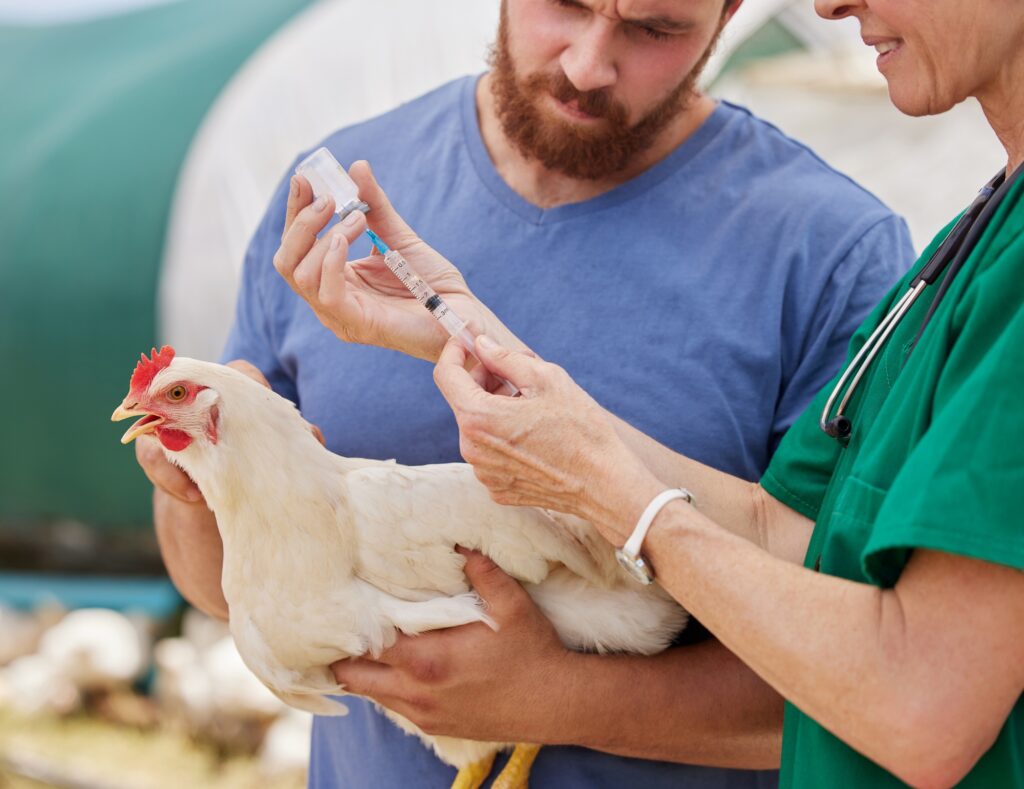In the ever-evolving world of poultry farming, protecting your flock against various diseases is a top priority.
Among these, Newcastle Disease (ND) stands out as a significant threat. Caused by the Newcastle Disease Virus (NDV), this disease can lead to severe economic losses due to high mortality rates and reduced productivity. You might wonder how to effectively safeguard your birds against this virus. This article delves into effective vaccination strategies and the latest developments in vaccine technology, including revolutionary approaches like recombinant vaccines and virus-like particles (VLPs).
By understanding these strategies, you can bolster your defenses against ND and maintain a healthy, productive poultry operation.
Understanding Newcastle Disease and Its Impact on Poultry
Newcastle Disease poses a serious risk to poultry worldwide. This viral infection affects various bird species, but domestic chickens are particularly susceptible. The virus is highly contagious, spreading rapidly through respiratory secretions and feces. Once introduced to a flock, NDV can decimate populations, leading to significant losses.
The symptoms of Newcastle Disease vary widely, ranging from mild respiratory issues to severe neurological signs. In severe cases, birds might exhibit tremors, paralysis, and even sudden death. The economic implications are staggering; not only do farmers face the loss of birds, but they also deal with increased veterinary costs and potential trade restrictions. Vaccination is crucial in controlling this disease, which can save both lives and livelihoods.
Several factors influence the effectiveness of vaccination strategies against NDV. These include the virulence of the circulating virus strains, the timing of vaccination, and the overall health and management of the flock. Understanding these elements allows for a more tailored vaccination approach, enhancing your flock’s protection against ND.
Moreover, with advancements in virology, we now have access to various vaccine types. From traditional inactivated vaccines to modern recombinant options, each has its pros and cons. This diversity allows poultry producers to choose the most suitable protection method tailored to their specific needs and circumstances. If you’d like to find out more, visit the official Poultry Ceva website.
The Role of Vaccines in Controlling Newcastle Disease
Vaccines play a pivotal role in controlling Newcastle Disease. They help stimulate the immune system, enabling birds to develop immunity against the virus without suffering from the disease’s severe consequences. There are several types of vaccines available, including inactivated, live-attenuated, and recombinant vaccines.
Inactivated vaccines contain killed virus particles. They generate an immune response but require booster doses for effective long-term immunity. On the other hand, live-attenuated vaccines contain weakened forms of the virus, providing strong and long-lasting protection with fewer doses. These live vaccines are often favored for their efficacy but come with the risk of reversion to virulence in rare cases.
Recent advancements have brought recombinant vaccines into the spotlight. These vaccines use genetic engineering to produce specific proteins from the virus, triggering an immune response without introducing the actual virus. For example, recombinant herpesvirus of turkeys (rHVT) has shown promise in providing protection against NDV while also targeting other diseases.
Additionally, virus-like particles (VLPs) have emerged as a novel approach. VLPs mimic the structure of viruses without containing viral genetic material, making them a safe vaccination choice. Their ability to elicit strong immune responses has made them a subject of interest in poultry vaccination research.
Choosing the right vaccine is crucial. Factors such as the age of the birds, the prevailing NDV strains in your area, and your overall flock management practices should inform your decision. Implementing a well-structured vaccination program can greatly enhance disease control and contribute to the overall success of your poultry operation.
Developing a Comprehensive Vaccination Program
Creating a comprehensive vaccination program requires careful planning and execution. The first step is to assess the specific needs of your flock based on various factors, including their age, health status, and the local strain of NDV. Understanding the epidemiology of Newcastle Disease in your region can help you choose the right vaccines and determine the optimal vaccination schedule.
Timing is crucial in vaccination. Young birds especially need to receive their vaccines at the right age to build immunity before they are exposed to NDV. A good strategy often includes vaccinating chicks at a young age followed by booster doses as they grow. You should also consider the timing of vaccination concerning other stressors such as transportation or environmental changes, which can impact the birds’ immune response.
Regularly consulting with a veterinarian experienced in poultry health can guide you in developing your vaccination schedule. They can help you stay updated on the latest developments in vaccination methods and monitor the effectiveness of your program over time. Using tools like CrossRef for accessing scientific publications can be beneficial for keeping up with the latest research in poultry health.
Moreover, record-keeping is essential. Maintain accurate vaccination records for each flock, including the types of vaccines used, vaccination dates, and any reactions observed. This data will allow you to assess the effectiveness of your program and make necessary adjustments to improve protection against ND.
Monitoring and Evaluating Vaccine Efficacy
Monitoring the effectiveness of your vaccination program is vital for controlling Newcastle Disease. Regular evaluations help you understand how well your chosen vaccines are performing and whether any adjustments are needed.

Vaccines play a pivotal role in controlling Newcastle Disease.
One effective method of assessing vaccination efficacy is through serological testing. This involves taking blood samples from your birds and testing them for the presence of antibodies against NDV. A high level of antibodies indicates a successful immune response and, consequently, good protection against the virus. Routine serological testing can help identify any gaps in the vaccination program or the need for additional booster shots.
Additionally, observing the health and performance of your flock is crucial. Look for signs of disease or decreased productivity, as these can indicate that the vaccines are not providing adequate protection. If you notice increased mortality rates or respiratory issues, it may be necessary to consult a veterinarian and reassess your vaccination strategy.
Maintaining a proactive approach in monitoring and evaluating vaccine efficacy will not only enhance protection against ND but also improve overall poultry health and productivity. Adaptation and responsiveness to changing conditions, including the emergence of new viruses, are essential in maintaining your flock’s health.
Future Directions in Poultry Vaccination Against Newcastle Disease
As we look to the future, innovative approaches in poultry vaccination against Newcastle Disease are on the horizon. Research continues to unveil new strategies that may revolutionize how we protect our flocks from this devastating disease.
The integration of genetic engineering has paved the way for vaccines that can offer broader protection against various strains of NDV. VLPs and recombinant vaccines are at the forefront of this development, with ongoing research focused on enhancing their efficacy and safety. Moreover, techniques such as reverse genetics allow scientists to create live vaccines with specific modifications that improve their safety profiles while maintaining strong immunogenicity.
Another promising area of research is the utilization of adjuvants—substances that enhance the body’s immune response to vaccines. By improving how vaccines perform, adjuvants can lead to better protection and potentially reduce the number of vaccinations needed throughout a bird’s life.
The use of digital tools and data analytics in monitoring flock health is also gaining traction. By harnessing data from various sources, you can make informed decisions about your vaccination strategies. This modern approach allows for tailored vaccination programs that respond dynamically to the health status of your birds and the presence of NDV in your area.
In conclusion, staying informed about these advances will help you adapt your strategies to provide the best protection for your poultry. In conclusion, as poultry producers, your commitment to implementing effective vaccination strategies is paramount in protecting against Newcastle Disease. By understanding the disease’s impact, utilizing available vaccines, and fostering an environment of continuous monitoring and improvement, you not only enhance the health of your flock but also secure the viability of your operation.
The advancements in vaccine technology, from recombinant approaches to virus-like particles, offer exciting possibilities for the future of poultry health. Embracing these innovations while remaining vigilant in your vaccination programs ensure that you are well-equipped to combat Newcastle Disease. Together, through education and proactive management, we can safeguard the future of poultry health and productivity.
